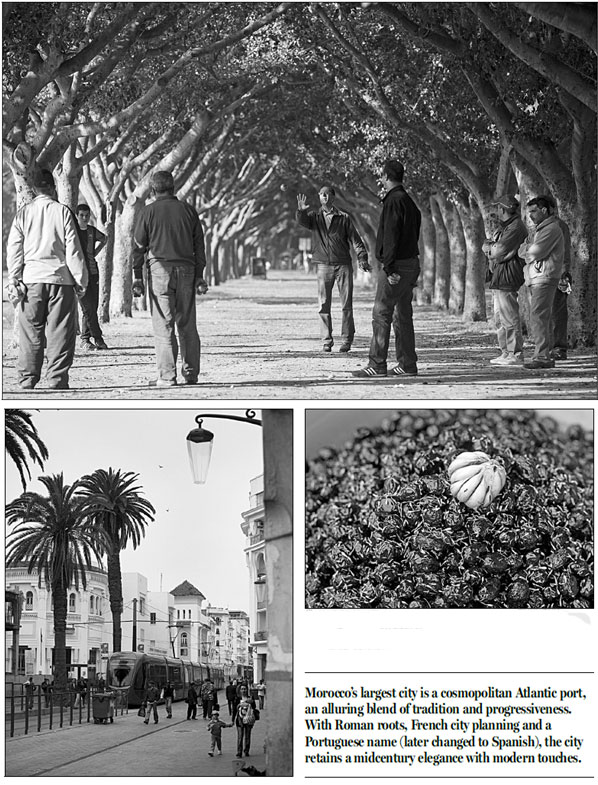36 hours in Casablanca
Updated: 2015-02-28 08:03
By Melena Ryzik(The New York Times)
|
||||||||
Marrakesh and Fez bewitch travelers with their ancient customs, and Tangier and Essaouira with their counterculture exotica, but Casablanca, Morocco's largest city, is a cosmopolitan Atlantic port, an alluring blend of tradition and progressiveness. With Roman roots, French city planning and a Portuguese name (later changed to Spanish) that dates to the 16th century, the city retains a mid century elegance with modern touches, including a sleek tram system across its center. In the oldest part of town, wanderers can buy straw berries and eggs off wheeled carts, eat sandwiches fried on the spot outside the mosque, and engage with locals, who always seem willing to share their pathways through the city's history and geography. A short taxi ride away, visitors can indulge in a luxury shopping spree at Galeries Lafayette, watch a 3-D movie or peer into a three-story aquarium. Here's looking at you, kid.
Friday
12:00 PM
To market: Unlike the overflowing mazes in Fez and other Moroccan cities, Casablanca's central market is small and manageable. White-walled stalls with green clay tile roofs dotted with foliage make for all the Instagrammable back-grounds you'll ever need. Vendors sell produce, nuts and dates and, in one stand, argan oil, the traditional Moroccan elixir for most everything. Linger long enough and eventually you will see the vendors line up for the call to prayer, and then join them in a quick tagine lunch, served at outdoor tables.
3:00 PM
Juice fast: Cafes are traditionally the province of Moroccanmen, who linger over mint tea and strong coffee. The brightly colored Espace El Frutero juice bar, near the market, is a prime meeting spot for gaggles of young women, friends and students. Fruit and nuts hang from the ceiling in sacks, and you can custom-order a mixed fruit cocktail (about 20 dirhams, about $2.35 at 8.55 dirhams to the dollar).
5:00 PM
Visita Mosque: Completed in1993 after many years in construction, the Hassan II Mosque is among Africa's largest, with one of the world's tallest minarets to boot. Thanks to its location on the waterfront, and the laser atop the minaret that beams toward Mecca, it's one of Morocco's most striking buildings. It's also one of the only mosques that permits non-Muslim visitors into its halls. Take a taxi over at dusk to witness local couples strolling along the shore, snacking on garbanzos sprinkled with salt or fresh potato chips sold in paper cones from pushcarts (12 dirhams) in the mist. The airy plaza in front of the mosque will be dotted with families, the children treating it as a playground, tearing up and down on their scooters. The mosque is an imposing sight but also a welcoming one; ticketed tours are available daily, in several languages, at the entrance.
9:00 PM
Of all the gin joints: Sure, Rick's Cafe is a tourist destination, a pastiche that has nothing to do with the 1942 cinematic classic, which was filmed on a sound-stage in California. But it is a lovely pastiche, opened by a former American diplomat, with pristine traditional architecture - arched doorways and mosaic floors-and a Moroccan pianoman, Issam Chabaa, tinkling out medleys of the familiar As Time Goes By and Sinatra's My Way. (The movie also plays on a loop around the space.) The waiters in fezzes might be a bit much, but the lighting is sultry, and any hokiness is easily forgotten when you're cozied up at the bar for a well-mixed Negroni (about 115 dirhams).
Saturday
11:00 PM
Green oasis: The Parc de La Ligue Arabe, the city's largest green space, sits behind a wide tree-lined boulevard filled with cafes. Its central esplanade, stocked with palms and flowering bushes, provides a respite from the urban traffic and grit. There are kids in colorful jerseys practicing soccer on one end, grandpas playing a lively game of petanque on the other. The only noise is birds chirping and the thwack of balls. Goodbye, jet lag.
12:00 PM
Art Break: A short stroll from the park is the Villa des Arts, housed in a 1934 Art Deco building - a white one, of course. Black-and-white marble stairs and wrought iron d��cor set off exhibits of contemporary paintings and sculpture from Morocco and abroad, in airy rooms. Admission is free, and the museum also hosts regular concerts and readings. For a less institutional setting, there is also a cutting edge art scene, with occasional exhibits in an old abattoir in a rundown part of town - the Bush-wick of Casablanca, with equally adventurous work.
1:30 PM
Lunch (or brunch?): With its sleek look - silver barstools, pendant lights - the Mood Caf��, in the trendy Quartier Gauthier, could just as easily be in Miami or Los Angeles. Hip young Casablancans congregate with their laptops at the white tables and bright chairs, taking advantage of the free WiFi and the light fare - sandwiches and fresh juices - on the menu. The house salad is a Moroccan take on a chef's salad, with ham, Brie, corn, olives and walnuts in a creamy dressing; somehow, it works. The restaurant also has a popular brunch special with a smoothie menu, in lieu of a state side mimosa. Expect to spend about 200 dirhams for lunch or brunch, for two.
4:00 PM
Shopping and Sipping: The Quartier Gauthier is a high-end shopping strip, with designer furniture stores, galleries, salons and international boutiques like Hugo Boss clustered along Rue Jean Jaur��s. Window-shop or spend some dirhams with the well-heeled here; keep an eye out for discounts on hip denimlines, manufactured in Casablanca. Then flaunt your finery at Le Chester's, a new-see-and-be-seen spot for locals and French expats. It's popular for happy hour or later, loungier outings. Beneath walls lit neon green and decorated with images of Mick Jagger and Stevie Wonder, and with the Jackson 5 and Amy Wine house on the sound-track, the clientele smokes and flirts over cheeseburgers. Nonsmoking restaurants are a rarity here; the tablefuls of women dolled up, "Sex and the City"-style, seem right at home.
8:00 PM
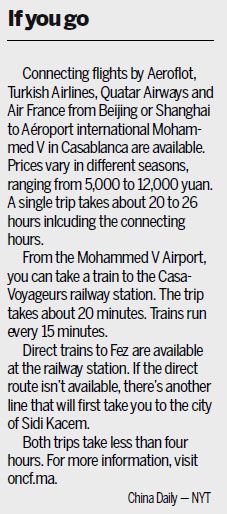
Dinner and a (Free) Show: "This is alcohol-free wine," the waiter said, pouring me a glass. "In Morocco, alcohol is only for the men, not for the women." A beat. "That's a joke!" he exclaimed gleefully. Opened in 1958, the waiter said, the family-owned Al-Mounia restaurant is a Casablanca institution; Jimmy Carter ate there. The veteran staff seems to be having classic fun at every opportunity - "Tourist!" the waiter called out tomy dinner companion, pretending he made some dining faux pas. Happily, the traditional menuis livened up and dressed with flourish - the harira soup came with a fat wedge of lemon and a plate of figs; pastilla with a dusting of cinnamon and sugar; effervescently fluffy couscous with carrots and squash and a pot of fragrant broth. Enjoy it under the pepper tree in the courtyard as the servers entertain you. Expect to pay about 400 dirhams for dinner for two.
10:30 PM
Dancing and Jamming: The strip of clubs and lounges on La Corniche, the water front boulevard, lends itself to barhopping (especially since they actually serve alcohol). Start at the unpretentious La Cal��che, a basement bar hidden down a side street from the Hotel Azur. Bob Marley posters and guitars hang from the ceiling, and the gregarious owner, Albert Cohen, joins jam sessions for an audience of multinational locals; touring musicians often sit in, playing American rock and funk, along with Middle Eastern music, for a mood that is college-level laid-back. For a glossier night, head to Le Cabestan, which could be a restaurant on the French Riviera, and its down-stairs neighbor, the flower filled Rose Bar, overlooking the ocean. In a back room with red velvet banquettes, a crowd can be found dancing, as aD.J. spins a remix of Lykke Li and a medley of David Bowie's Let's Dance into Whitney Houston's I Wanna Dance with Somebody. Bottles chill in ice buckets and dress codes permit-or encourage-a peek of skin.
Sunday
10:30 PM
The Sweet Stuff: In the leafyQuartier Habous neighborhood, near the king's palace, is Patisserie Bennis Habous, a family-owned Casablancan tradition since 1938. Downanar-rowstair well is its slight retail space, with blue and yellow tile walls and white-coated workers ferrying trays of almond pastries from the ovens across the street. Choose from cornes de gazelles, doigts aux sesame, macaroons and more (50 to 130 dirhams per kilo).
12:30 PM
Souvenirs and Tea: With your snacks, you can-wander the streets and nearby square, where there's a small market for ceramics, babouche slippers and rugs. The handicrafts are not as impressive as those elsewhere in Morocco, but the less frantic environment allows time to bargain and talk-don't be surprised if a shopkeeper invites you in for a pot of mint tea. Don't think of turning him down.
The New York Times
|
Clockwise from top: Men play petanque under a canopy of trees at the Parc de La Ligue Arabe; black olives with garlic are sold by the kilos in one of the city's open markets; a modern tram snakes through the center of Casablanca. Ben Sklar / For The New York Times |
(China Daily 02/28/2015 page17)
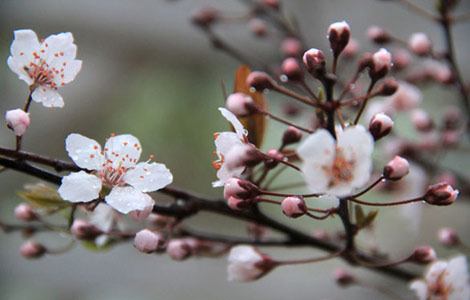
 Best times to view spring flowers in Beijing
Best times to view spring flowers in Beijing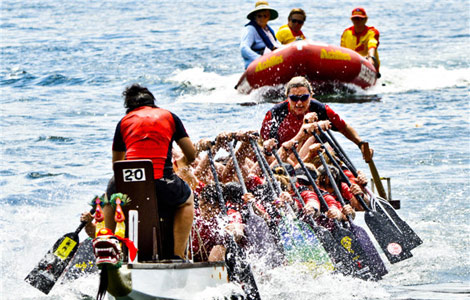
 Dragon boat race to celebrate Chinese New Year in Sydney
Dragon boat race to celebrate Chinese New Year in Sydney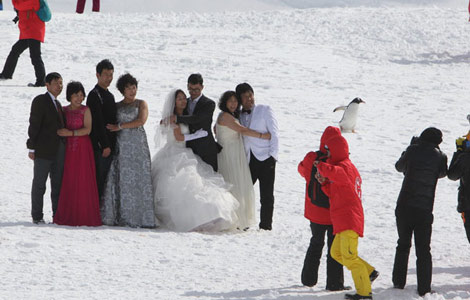
 South Pole setting for wedding photos, penguins included
South Pole setting for wedding photos, penguins included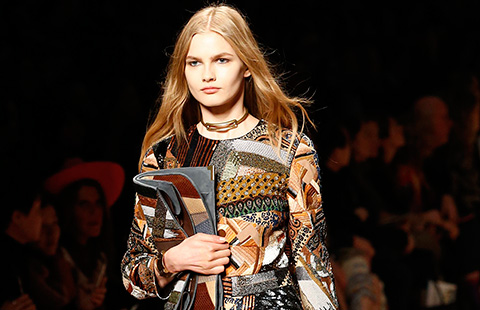
 Milan Fashion Week - Autumn/Winter 2015-16
Milan Fashion Week - Autumn/Winter 2015-16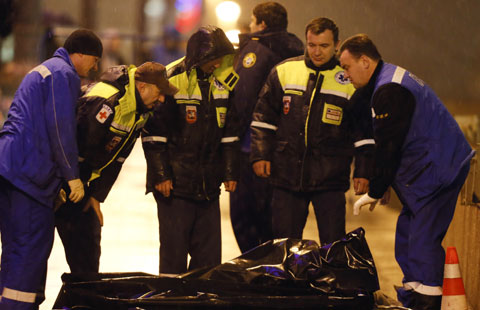
 Russian opposition leader Nemtsov shot dead in Moscow
Russian opposition leader Nemtsov shot dead in Moscow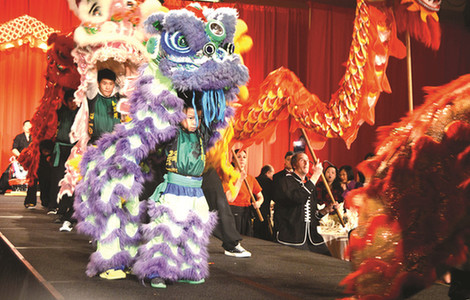
 Across America over the week (from Feb 20 to 26)
Across America over the week (from Feb 20 to 26)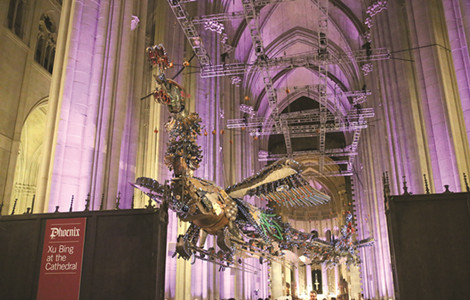
 Phoenix landing
Phoenix landing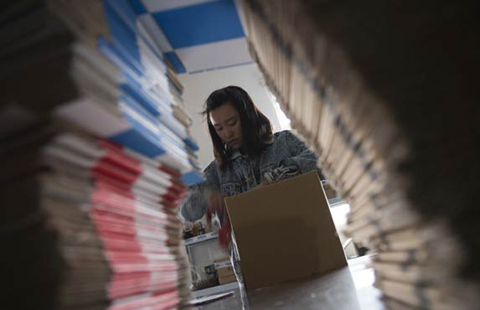
 Inside a Taobao village
Inside a Taobao village
Most Viewed
Editor's Picks

|

|

|

|

|

|
Today's Top News
PBOC cuts rates to ease business financing
Former celebrity TV anchor on crusade against pollution
China ends UN council presidency
Ling Jihua removed from CPPCC leadership list
Tech firms cut from approval list
Yuan on move, but not to top
'Star Trek' legend Leonard Nimoy dies at 83
EB-5 could harbor fraud: report
US Weekly

|

|
